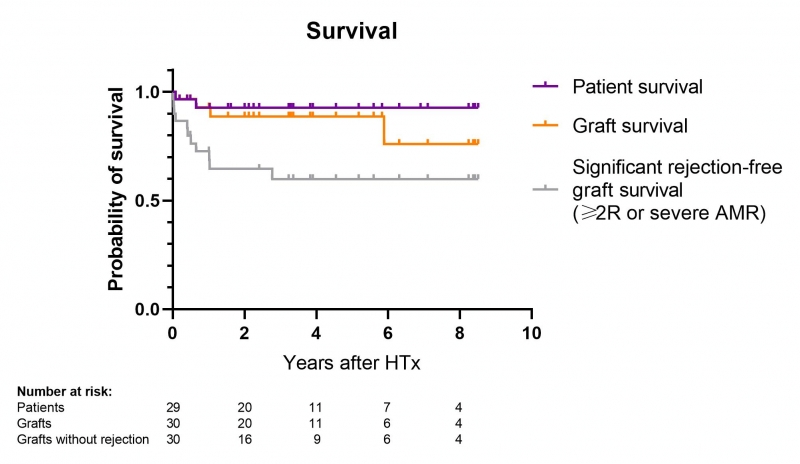MID-TERM RESULTS OF A NEWLY INTRODUCED NATIONWIDE PEDIATRIC HEART TRANSPLANTATION PROGRAM
Background and Aim: Heart transplantation (HTx) is an effective treatment for terminal heart failure in children. Comprehensive pediatric nationwide HTx program was introduced in 2014 in the Czech Republic. The aim was to evaluate its mid-term characteristics and outcomes of the program.
Methods: Retrospective observational study including all patients who underwent HTx from the beginning of the HTx program in June 2014 till December 2022. Data from the institutional database were used for descriptive statistics and survival analysis.
Results: A total of 30 HTx were performed in 29 patients with congenital heart disease (CHD, N=15, single ventricular physiology in 10 patients, median 4 prior cardiac surgeries per patient) and cardiomyopathy (CMP, N=14). Median age at HTx was 10.2 years (IQR 2.5–14.4) and median time spent on the waiting list was 84 days (IQR 42–228). Ten patients were bridged to HTx by durable left ventricular assist devices (LVADs) for a mean duration of 104 (SD 89) days.
There was 1 early and 1 late death during median follow-up of 3.3 (IQR 1.3 – 6.1) years. Survival probability at 5 years after HTx was 93%. Two patients underwent re-transplantation (one of them in an adult center). Significant rejection-free survival at 1, 3, and 5 years after HTx was 76%, 63%, and 63%, respectively.
Conclusions: The introduced pediatric HTx program reflects the complexity of the treated population, with half of the patients having complex CHD and one-third being bridged to HTx by LVADs. Mid-term results are comparable to worldwide data and show excellent survival and modest rejection-free survival.
The data confirm the possibility of establishing a successful nationwide pediatric HTx program in a relatively small-population country with well-developed pediatric cardiovascular care.
